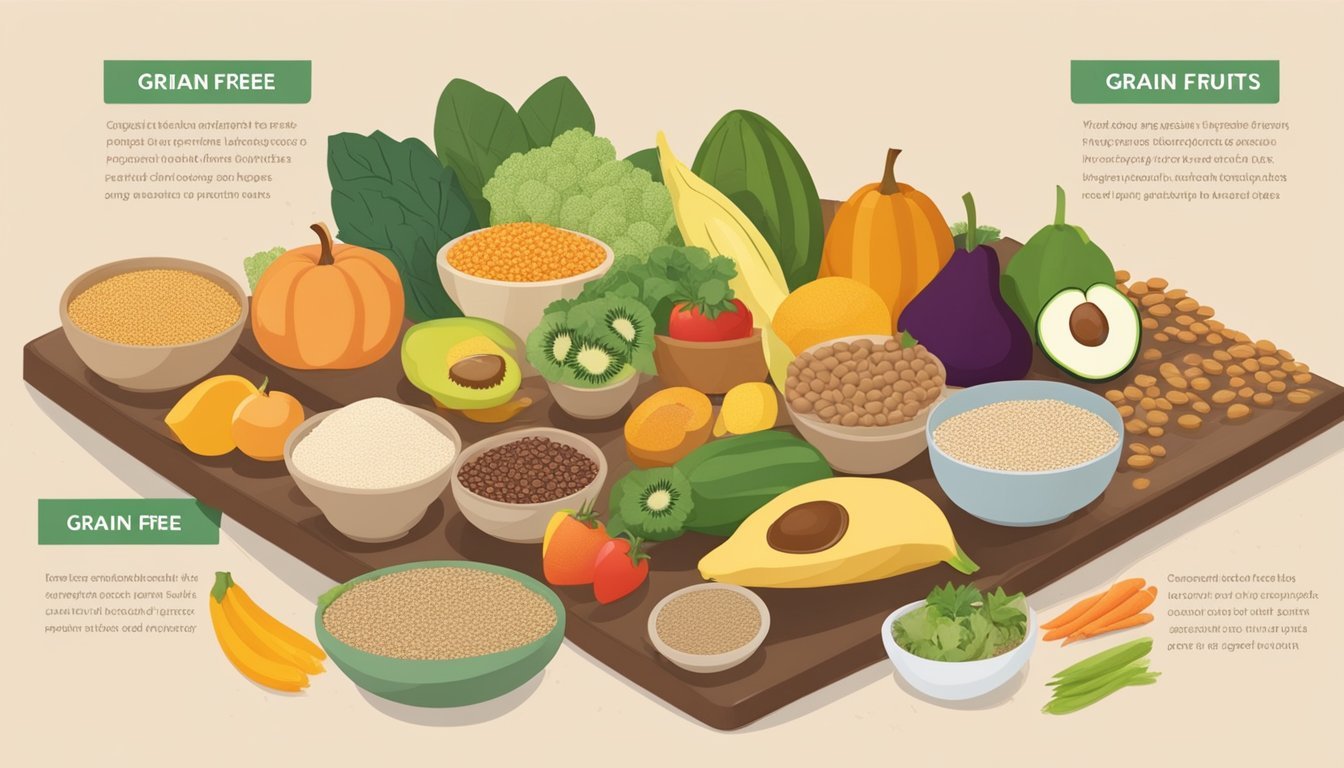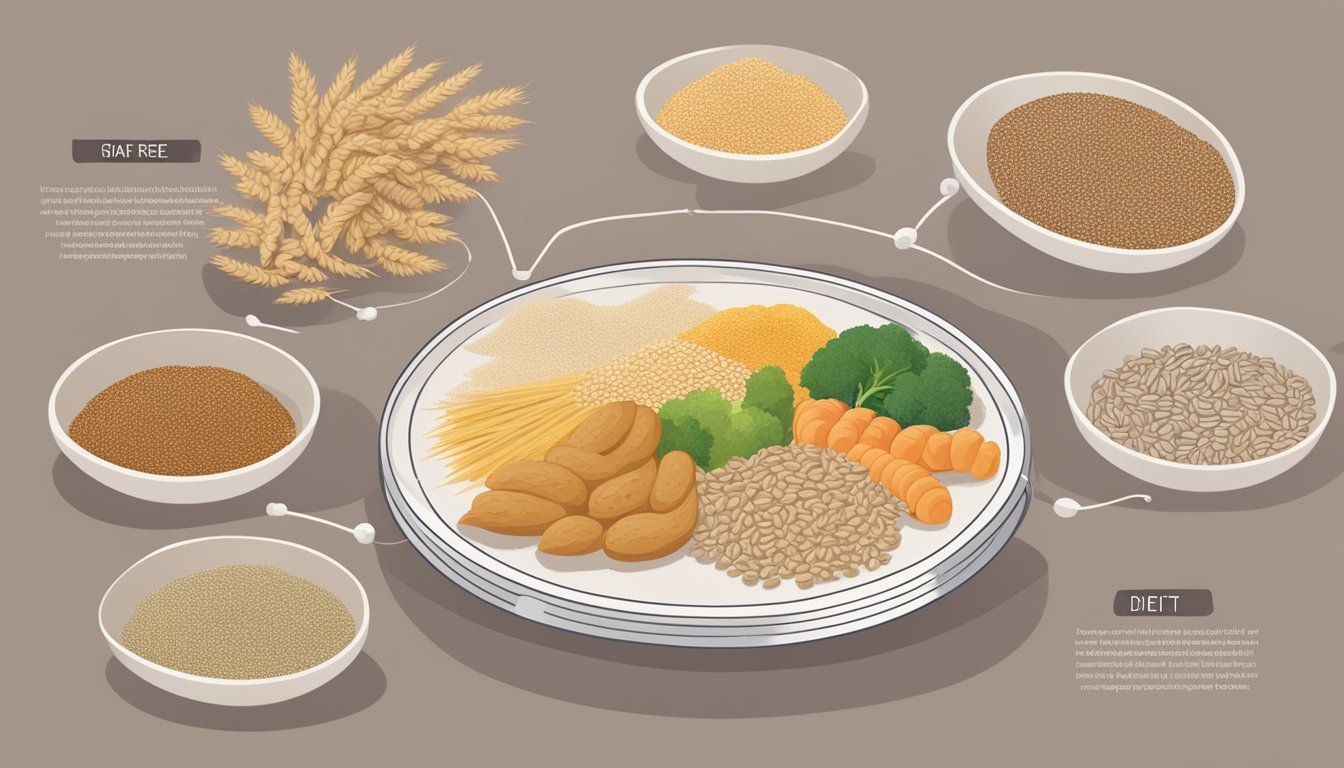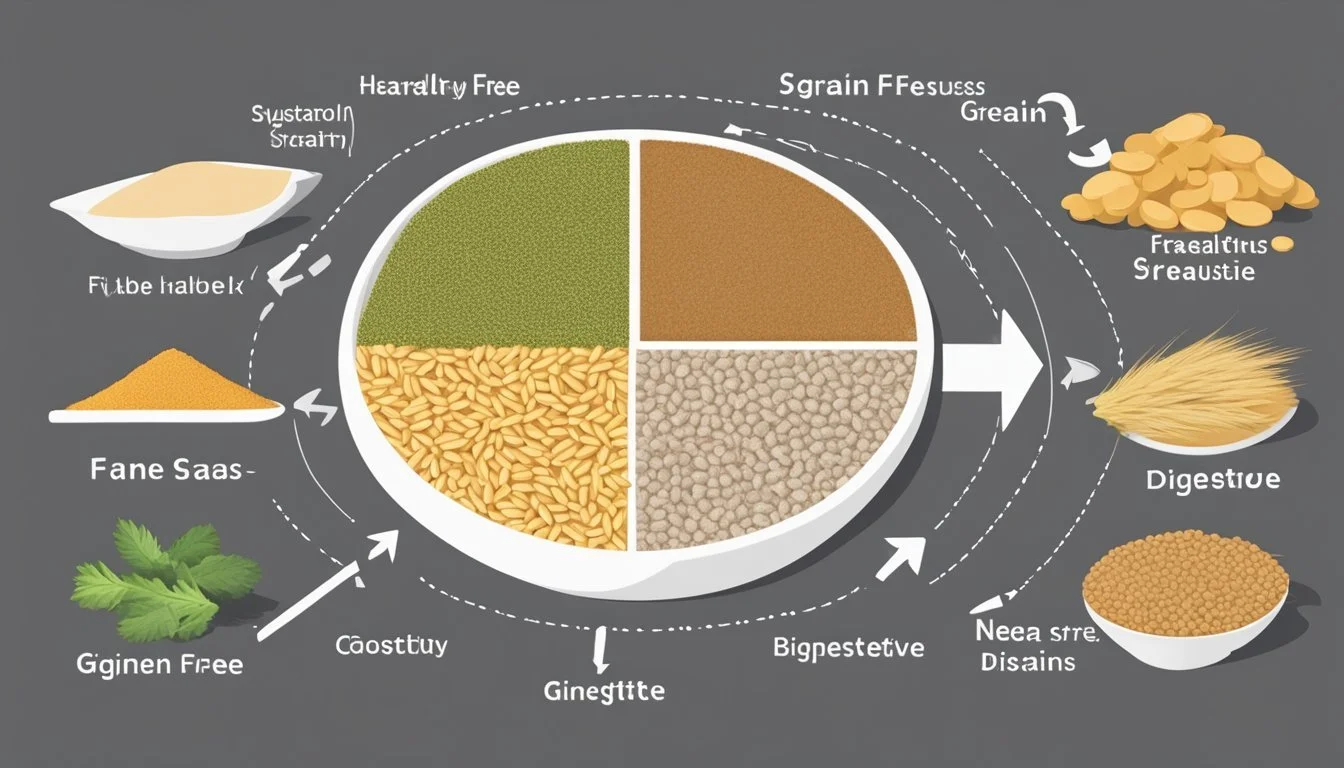The Role of a Grain-Free Diet in Digestive Disorder Management
A grain-free diet eliminates grains and often grain-derived foods, which means waving goodbye to wheat, rye, barley, oats, and even corn and rice. The premise of such a nutritional approach is to reduce the intake of certain carbohydrates that may contribute to digestive discomfort, especially for individuals with certain digestive disorders. For these individuals, a grain-free diet might alleviate symptoms and improve gut health.
Digestive disorders range widely from inflammatory bowel diseases, such as Crohn's disease and ulcerative colitis, to functional gastrointestinal issues like irritable bowel syndrome (IBS). Nutrition plays a critical role in managing these conditions, and diet modifications, including grain elimination, can offer symptomatic relief. In particular, some individuals may be sensitive to high-FODMAP foods—a group of fermentable oligo-, di-, monosaccharides, and polyols that include grains—which can aggravate the gut and worsen symptoms.
While a grain-free diet is not a one-size-fits-all solution and is not necessary for all, for some patients, it serves as a strategic intervention alongside medical treatments to manage their digestive health. It is important to approach such a dietary change with consideration of one's overall nutritional needs and under the guidance of healthcare professionals who can support the journey towards a symptom-managed life.
A grain-free diet plays a significant role in the management of digestive disorders, offering a potential avenue for individuals with grain-free food allergies sensitivities to find relief and support digestive health. As individuals explore the benefits of incorporating grain-free healthy fats into their meals, they may discover a gut-friendly approach that contributes to digestive well-being. Moreover, ensuring that grain-free seniors find satisfaction in their dietary choices is crucial for promoting digestive health and overall well-being.
For families, creating an environment of grain-free fun for children can be an essential aspect of the transition. Additionally, the experience of grain-free shopping can present both opportunities and challenges, as individuals seek to adapt to a new way of selecting nourishing options. Furthermore, adjusting to a grain-free breakfast or a satisfying grain-free lunch can support digestive health and contribute to overall well-being.
Understanding the role of a grain-free diet in managing digestive disorders underscores the potential benefits of dietary choices in supporting digestive health. By embracing a grain-free lifestyle that prioritizes gut-friendly foods, individuals with digestive sensitivities may find relief and a path to improved well-being.
Understanding Digestive Disorders
Digestive disorders encompass a variety of conditions that affect the gastrointestinal (GI) tract. These ailments can range from mild to severe, and each has its own set of symptoms, causes, and treatments.
Inflammatory bowel disease (IBD) comprises two main types: Crohn's disease and ulcerative colitis. Both conditions are marked by chronic inflammation of the GI tract, which can cause symptoms such as abdominal pain, bloating, and diarrhea. The exact cause of IBD is not fully understood but is believed to involve a combination of genetic and environmental factors.
Irritable bowel syndrome (IBS) is another common GI disorder characterized by a group of symptoms that include abdominal pain, bloating, gas, and altered bowel habits such as constipation and diarrhea. Unlike IBD, IBS does not cause inflammation or permanent damage to the GI tract.
Celiac disease is an autoimmune disorder triggered by the ingestion of gluten, a protein found in wheat, barley, and rye. When individuals with celiac disease consume gluten, their immune system responds by damaging the small intestine, leading to nutrient malabsorption and various GI symptoms.
In contrast, non-celiac gluten sensitivity (NCGS) shares symptoms with celiac disease, such as abdominal pain and bloating, but is not accompanied by the same intestinal damage.
Condition Common Symptoms Inflammation? Autoimmune? Inflammatory Bowel Disease Abdominal pain, bloating, diarrhea Yes Yes Irritable Bowel Syndrome Abdominal pain, bloating, constipation No No Celiac Disease Abdominal pain, bloating, gas Yes Yes Non-Celiac Gluten Sensitivity Abdominal pain, bloating No No
Managing these disorders often requires dietary adjustments, medical treatments, and lifestyle changes. Recognition and diagnosis by healthcare professionals are crucial for effective management.
Basics of a Grain-Free Diet
A grain-free diet involves the elimination of all grains and grain-derived products, emphasizing alternative sources of nutrients, particularly for individuals managing digestive disorders.
Defining a Grain-Free Diet
A grain-free diet strictly excludes all types of grains, including wheat, barley, rye, and corn. Typically adopted due to health concerns or dietary preferences, it also excludes foods that contain grain derivatives. Though similar to a gluten-free diet, which eliminates gluten—a protein found in wheat, barley, and rye—a grain-free diet removes all grains, whether they contain gluten or not.
Common Foods Consumed
On a grain-free diet, the focus shifts to other food groups to ensure a balanced intake of proteins, fats, and carbohydrates. Common foods include:
Meat and Fish: Beef, chicken, pork, salmon, and other types of seafood.
Dairy and Eggs: Milk, cheese, butter, and eggs.
Nuts and Seeds: Almonds, walnuts, flaxseeds, and chia seeds.
Legumes: Beans, lentils, and peas.
Fruits and Vegetables: A wide variety, with a focus on leafy greens, berries, and other low-glycemic options.
Fats: Avocados, olive oil, and coconut oil.
Foods to Avoid
A grain-free diet means avoiding not only grains but also products made from them. Foods to avoid include:
All Grains: Foods made with wheat, barley, rye, rice, oats, and corn.
Processed Foods: Many contain hidden grain ingredients.
Grain-based alternatives: Such as rice milk or oat milk.
By excluding grains, individuals prioritize other nutrient-rich foods, supporting specific dietary needs, especially for those with digestive issues who may react poorly to grains.
Impact of a Grain-Free Diet on Digestive Health
A grain-free diet may alleviate certain digestive disorders by reducing inflammation and intestinal permeability. However, it is critical to consider the dietary balance to prevent nutrient deficiencies.
Digestive Benefits
A grain-free diet can offer digestive relief to individuals with specific conditions such as celiac disease or non-celiac gluten sensitivity, where the elimination of gluten—a protein found in certain grains—is necessary. Inflammation in the gut is commonly associated with such conditions, and removing the inflammatory source can lead to a reduction in inflammatory markers.
Moreover, some people might experience an improvement in intestinal permeability, commonly referred to as "leaky gut," when they remove grains from their diet. This can result in fewer instances of digestive discomfort and improved gut health. Additionally, for those who are sensitive, a grain-free diet might help in rebalancing the gut microbiota, leading to a healthier digestive ecosystem.
Potential Risks and Considerations
While there can be benefits, there are also potential risks when adopting a grain-free diet for digestive health. Grains are a significant source of dietary fibre, which is crucial for digestive regularity. A grain-free diet might lead to inadequate fibre intake unless properly supplemented with non-grain sources, such as vegetables and certain seeds.
Furthermore, grains contribute to the intake of important fatty acids and micronutrients. The absence of whole grains in the diet increases the risk of nutrient deficiencies, particularly in B vitamins, iron, and magnesium. Individuals considering a grain-free diet should plan carefully, often with the guidance of a healthcare provider, to ensure they are not missing out on these crucial nutrients.
Grain-Free Diet and Chronic Digestive Conditions
Adopting a grain-free diet can significantly impact individuals with chronic digestive disorders. It is often considered for conditions such as celiac disease, irritable bowel syndrome (IBS), and inflammatory bowel disease (IBD), where diet plays a crucial role in managing symptoms and achieving remission.
Celiac Disease and Gluten-Free Needs
People with celiac disease must adhere to a strict gluten-free diet, as the ingestion of gluten triggers an immune response that damages the small intestine. A grain-free diet inherently eliminates common gluten-containing grains like wheat, barley, and rye. Staples of this diet include:
Meats and fish: beef, chicken, pork, salmon
Dairy products: milk, cheese, yogurt
Fruits and vegetables: all types
Alternative grains: quinoa, buckwheat
Starches: potatoes, sweet potatoes
Managing IBS with Diet
For those with irritable bowel syndrome (IBS), diet modification can be essential to control symptoms. A low FODMAP diet, which restricts certain carbohydrates, is often beneficial. While not all grains are high in FODMAPs, a grain-free approach may simplify dietary changes and reduce the risk of symptom-triggering errors.
Key low FODMAP foods include:
Vegetables: carrots, cucumbers, lettuce
Fruits: strawberries, oranges, grapes
Proteins: eggs, tofu
Nuts: walnuts, peanuts
Grain-Free Diet in IBD Management
Inflammatory bowel disease (IBD) incorporates conditions such as Crohn's disease and ulcerative colitis. Flare-ups in these conditions can be mitigated through dietary strategies. For some patients, a grain-free diet can decrease inflammation and promote remission. However, it's crucial to note that this approach is highly individual and requires professional guidance.
Helpful dietary components for IBD include:
Lean proteins: turkey, fish
Low-fiber fruits: bananas, cantaloupe (how long does cantaloupe last?)
Cooked vegetables: squash, asparagus
Healthy fats: olive oil, avocados
In conclusion, while a grain-free diet is not a one-size-fits-all solution for digestive disorders, it offers an alternative approach that might benefit individuals with specific conditions and dietary needs. Careful consideration and consultation with a healthcare provider are advisable to ensure nutritional adequacy and to tailor the diet to the individual's condition and lifestyle.
Nutritional Considerations and Alternatives
When adopting a grain-free diet, it's crucial to maintain a balanced intake of nutrients that grains typically provide. This includes ensuring adequate consumption of fibre, vitamins, and trace minerals that may become deficient without whole grains.
Ensuring Balanced Nutrition
A grain-free diet can lead to a deficiency in certain nutrients found abundantly in whole grains. To ensure a balanced diet, individuals should focus on fiber-rich alternatives such as fruits, vegetables, and seeds. Legumes and nuts are excellent sources of magnesium and phosphorus, which are important for bone health and energy production. For those following a paleo diet, options like leafy greens and certain fruits can provide these nutrients.
Fiber Alternatives: Chia seeds, flaxseeds, fruits, vegetables.
Magnesium Sources: Spinach, pumpkin seeds, almonds.
Phosphorus Sources: Sunflower seeds, lentils, cheese.
Supplementation and Nutrient Density
In the absence of whole grains, individuals must seek other sources to meet their daily requirements of iron, folate, selenium, and manganese. They should consider supplementation under the guidance of a healthcare provider, especially for nutrients that are challenging to obtain in adequate amounts from a grain-free diet. Foods such as dairy products can be good sources of some nutrients but may not be sustainable or preferable for all. An emphasis on nutrient-dense foods is crucial in order to satisfy the body's needs for these vital nutrients.
Iron: Red meat, shellfish, spinach.
Folate: Dark green vegetables, citrus fruits, eggs.
Selenium and Manganese: Brazil nuts, seafood, poultry.
It's important for individuals to ensure a suitable intake of vitamin D, which is vital for bone health and immune function. Sunlight exposure and certain foods like fatty fish or fortified products can help maintain adequate vitamin D levels.
Grain-Free Diet in Special Populations
Individuals with specific digestive disorders may find that a grain-free diet offers relief from symptoms. However, the efficacy and considerations of such a diet can vary across different groups such as men, women, adults, and children.
Grain-Free Diet for Men and Women
Men and women may experience distinct health outcomes when adopting a grain-free diet. In some cases, men may notice improvements in digestion and reductions in inflammatory responses, especially if they have conditions like celiac disease or non-celiac gluten sensitivity. For women, the diet may offer benefits for those with autoimmune disorders or IBS but should be balanced to ensure proper nutrient intake due to their unique requirements, such as iron during reproductive years.
Prevalence: Autoimmune conditions, which can be managed by a grain-free diet, tend to be more prevalent in women.
Considerations for Women:
Iron: Women need to ensure iron-rich foods are included.
Calcium: Essential for bone health, calcium must be sourced from non-grain foods.
Considerations for Men:
Muscle Mass: Adequate protein sources are vital for maintaining muscle mass.
Heart Health: Men should monitor fatty acid intake for heart health.
Grain-Free Diet for Adults and Children
When adults adopt a grain-free diet, the focus is often on managing chronic conditions and improving overall gut health. The diet requires careful planning to ensure that all nutritional needs are met since grains are a common source of dietary fiber and B vitamins.
Adult Adults:
Fiber Intake: Must include non-grain sources of fiber like vegetables.
Energy Levels: Need to ensure diet provides adequate energy for daily activities.
For children, the primary concern is ensuring proper growth and development. A grain-free diet for children requires close supervision and possibly consultation with a dietitian, as children have higher energy and nutrient needs relative to their size.
Children:
Growth: Requires careful monitoring to ensure proper nutrient intake.
Nutritional Balance: Vital to support developmental milestones.
Broader Health Implications of a Grain-Free Diet
A grain-free diet may offer specific health benefits for certain individuals. This diet's potential effects extend to weight management, mood stabilization, and the modulation of autoimmune diseases.
Weight Management and Metabolic Health
Adopting a grain-free diet can influence weight loss and metabolic health. Without grain-based foods, individuals may experience a decrease in caloric intake and a shift towards consuming more protein and fat, which can promote satiety and reduce overall calorie consumption. Studies have shown improvements in diabetes indicators, such as blood sugar control, as grains, especially refined grains, are significant sources of carbohydrates.
Mood Disorders and Cognitive Effects
The exclusion of grains from the diet has been associated with changes in mood and cognitive function. For some people, a grain-free diet can lead to a reduction in symptoms of depression and anxiety. This diet can also impact the occurrence of brain fog, a term colloquially used to describe periods of mental confusion or lack of mental clarity. The concept of grain brain hypothesizes that grains can lead to inflammation, adversely affecting brain health, although scientific consensus on this is still developing.
Autoimmune Diseases and Systemic Inflammation
A grain-free diet might benefit individuals with certain autoimmune diseases such as rheumatoid arthritis or psoriatic arthritis by reducing systemic inflammation. The removal of grains, which contain compounds that can contribute to an inflammatory response, may alleviate the chronic inflammation that characterizes these conditions. This dietary change can sometimes lead to symptom relief in autoimmune diseases, although individual responses can vary widely.
Scientific Evidence and Clinical Research
In examining the impact of grain-free diets on digestive disorders, a substantial body of research, including clinical trials and studies, provides valuable insights. This evidence forms the basis for current dietary approaches and therapeutic interventions.
Research on Gluten and Digestive Health
Research has consistently confirmed that gluten, a protein found in wheat, barley, and rye, is the trigger for celiac disease (CD), an autoimmune disorder that affects the digestive system. JAMA has published findings that affirm a strict gluten-free diet as the cornerstone of managing CD. These dietary changes lead to the regeneration of the intestinal lining and reduction of symptoms for individuals with CD.
Additionally, studies have detected that a gluten-free diet can also benefit individuals with gluten sensitivity and wheat allergies. It involves the meticulous exclusion of grains known to contain gluten and careful scrutiny of food labels to prevent inadvertent ingestion of gluten-containing ingredients.
Clinical Trials and Studies on Grain-Free Diets
Clinical trials have explored the broader spectrum of grain-free diets beyond gluten removal. For conditions like inflammatory bowel disease (IBD), which includes Crohn's disease and ulcerative colitis, grain-free diets have been scrutinized for their therapeutic potential.
Exclusive Enteral Nutrition (EEN): Enteral nutrition, especially exclusive enteral nutrition, is a well-researched dietary intervention for managing Crohn’s disease among children. In this treatment, orally consumed nutrition supplements replace usual food intake to induce disease remission.
Evidence-based outcomes: There is strong support for EEN’s role in inducing remission in comparison to some pharmacotherapies.
Researchers have sought to understand how these diets might alleviate symptoms of IBD. Clinical trials investigating such dietary strategies often aim to measure the reduction in inflammation and overall digestive health improvement. They also compare the efficacy of these dietary interventions with standard pharmacological treatments.
Implementing a Grain-Free Diet
Adopting a grain-free diet involves strategic dietary planning and understanding the potential challenges one might face in social settings. It is essential to work with healthcare professionals, such as registered dietitians (RDs), licensed dietitians (LDs), registered dietitian nutritionists (RDNs), or certified diabetes educators (CDEs), to manage the diet effectively and ensure nutritional needs are met.
Dietary Planning and Management
One must collaborate with a healthcare professional to develop a comprehensive grain-free meal plan. This plan should include a variety of foods that are both nutritious and grain-free to establish a sustainable diet. A balanced grain-free diet typically encompasses the following:
Protein sources: Include options such as poultry, fish, eggs, and plant-based proteins like legumes, tofu, and tempeh.
Vegetables and fruits: Emphasize a variety of colors and types to ensure a wide range of nutrients.
Healthy fats: Incorporate sources like avocados, nuts, seeds, and olive oil.
Dairy or dairy alternatives: Choose from cheeses, yogurt, and calcium-fortified non-dairy alternatives.
Pseudocereals: Quinoa, buckwheat, and amaranth are not true grains and can be included in moderation.
Examples of Grain-Free Foods:
Food Category Examples Protein Chicken, tofu, lentils Vegetables Broccoli, kale, bell peppers Fruits Apples, berries, oranges Healthy Fats Almonds, olive oil, flaxseed Dairy Greek yogurt, cheese
Regular monitoring and adjusting the diet as needed can help to mitigate any risk factors associated with nutrient deficiencies.
Navigating Social Situations and Dining Out
When dining out or attending social events, individuals on a grain-free diet should plan ahead and communicate dietary needs clearly. Here are specific strategies they can employ:
Research restaurant menus in advance and look for grain-free options or dishes that can be modified.
Inform the server or chef about specific dietary restrictions to avoid cross-contamination with grains.
Choose naturally grain-free dishes such as salads, protein-based entrées, and vegetable sides.
For social gatherings, offering to bring a grain-free dish can ensure there is something suitable to eat, while also introducing others to the diet. It is vital to not only focus on the restrictions of a grain-free diet but to also appreciate the variety of foods that can be included, making the social aspect less daunting.





